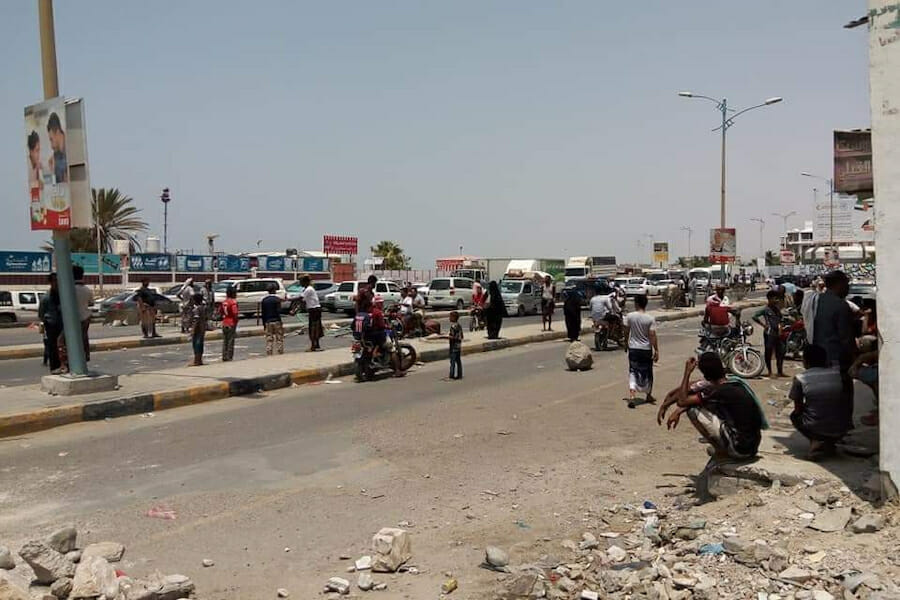
Yemen: Corruption and Blackouts Push Angry People To Protest
In the summer, temperatures can reach 109 degrees Fahrenheit in Mukalla, the capital of Hadramout province in southern Yemen. This coastal city was liberated from al-Qaeda’s grip in 2016 and has not engaged in any battles with the Houthi rebels. However, the effects of the Yemeni war and government corruption remain the main motive for the protests in the city. This summer, there have been many protests in Mukalla because of the increasing blackouts, which can exceed 14 hours a day.
As high temperatures and blackouts increase, the suffering of citizens and the reduction of their ability to work and produce increases, and can also lead to increased deaths, especially among the elderly and those suffering from diabetes and high blood pressure.
Protesters in Mukalla, mostly young, prevented cars from passing through and there were burned tires. Usually, the army intervenes, cautiously, but these troops did not intervene in the recent protests during the last days of July. According to a special military source, the army received orders not to intervene.
Interestingly, protesters are demanding local authority, instead of the central government, to solve energy problems, as well as other public services. The public no longer trusts the central government. It “steals the country’s resources,” they say. The demands of angry protesters point to the growing powers of local governors or at least the demand for more powers for local governors. For example, protesters demand local authority to stop oil exports from Hadramout as a pressure tool.
Most disturbing for the protesters and the general public is their knowledge that their region, Hadramout, is the primary source of government revenue, yet they do not receive their basic rights. Yemen has proven oil reserves of around 3 billion barrels, 80 percent of it located in Hadramout. Yemen also has 17 trillion cubic feet of proven reserves of natural gas. Besides oil and gas, Yemen exports gold as well. For example, the value of gold exported in 2016 was $531 million and $501 million in 2017.
The problem of the blackouts is not a new one in Yemen. Data from the World Bank indicated that, as recently as 2010, only 40 percent of Yemen’s population had access to electricity. The situation has become worse since the outbreak of war. Even the large cities are suffering from frequent blackouts. The blackout hours increase during the summer, where they usually exceed 14 hours per day. This is due to mismanagement, corruption, and outdated electricity infrastructure.
Petroleum, including distillate and residual fuel oil, fuels much of Yemen’s electricity generation. Electricity stations in Hadramout get the necessary fuel from Aden, the port city in South Yemen. Fuel shipments are often delayed, causing the inability to generate power. There is no exact information about the cause of the delays, however, the oil refinery in Aden has long been considered one of the biggest sources of corruption in Yemen since before the war. For instance, according to WikiLeaks, the oil ministry was blocking oil data from the parliament to cover illegal activities by the Yemeni government. The smuggling of subsidized oil derivatives to Yemen’s neighbors is one of the most prominent of these illegal activities.
Marib, in northern Yemen, is the second source of fuel used to generate electricity in Hadramout. As with Aden, fuel shipments are often delayed. Oil and gas production facilities in Marib are also known for corruption. For instance, in 2017, the executive director of Safer, a state-owned oil company, said that the security units responsible for protecting the oil fields in Marib were stealing and looting oil.
A UN report in 2018 referred to the possibility of a transfer of public funds originally allocated for the production of electricity in the government-controlled areas of Aden, Lahj, and Abyan. Also, according to the same report, there were large discrepancies between the volume of fuel cited in the tender documents and the amount of fuel subsequently directed to the power plants in 2017.
Corruption in Yemen plays a deadly role, just as war does. It drives the population to the streets, but instead of demanding the overthrow of the government, as the people did in the days of the Arab Spring, the people of southern Yemen demand independence and the management of their own resources.
Other provinces, specifically Marib and Mahara, have already blocked their financial revenues from being transferred to the legitimate central government, giving local rulers greater powers to manage their areas. This leads to the belief that Yemen is likely to be divided into several small states, not just South and North.
